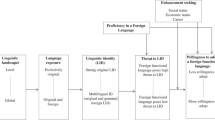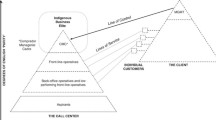Abstract
In this paper, we focus on the role of language in cross-border mergers and acquisitions and explore how organization members’ language skills, or fluency, in the adopted lingua franca may impact their reactions to a merger. Drawing on a qualitative study of the post-merger integration between a French and Dutch airline where English was adopted as a lingua franca, we illustrate how language fluency influences the ability of individuals to give meaning to their changed circumstances. Moreover, we elaborate on how language fluency indexes social groupings and identities, and may thus be a driver of perceptions of status inequality and identity politics between different groups of employees. With our study we draw attention to the multi-faceted role of English as a lingua franca. Our findings also contribute to research on sociocultural dynamics associated with post-merger integration and the role of language in mergers and acquisitions, as well as in multinational companies more generally.

Similar content being viewed by others
Notes
These units focus on servicing international clients and Dutchco members within these units were ‘living the merger’ in their daily jobs as they had to interact with Frenchco members on a daily basis.
References
Akkermans, D., Harzing, A. W., & van Witteloostuijn, A. (2010). Cultural accommodation and language priming: competitive versus cooperative behavior in a prisoner’s dilemma game. Management International Review, 50(5), 559–583.
Bachman, L. (1990). Fundamental considerations in language testing. Oxford: Oxford University Press.
Birkinshaw, J., Bresman, H., & Håkanson, L. (2000). Managing the post-acquisition integration process: how the human integration and task integration processes interact to foster value creation. Journal of Management Studies, 37(3), 395–425.
Björkman, I., Stahl, G., & Vaara, E. (2007). Impact of cultural differences on capability transfer in acquisitions: the mediating roles of capability complementarity, absorptive capacity, and social integration. Journal of International Business Studies, 38(4), 658–672.
Bordia, S., & Bordia, P. (2015). Employees’ willingness to adopt a foreign functional language in multilingual organizations: the role of linguistic identity. Journal of International Business Studies, 46(4), 415–428.
Brannen, M. Y., & Doz, Y. L. (2010). From a distance and detached to up close and personal: bridging strategic and cross-cultural perspectives in international management research and practice. Scandinavian Journal of Management, 26(3), 236–247.
Brannen, M. Y., & Peterson, M. F. (2009). Merging without alienating: interventions promoting cross-cultural organizational integration and their limitations. Journal of International Business Studies, 40(3), 468–489.
Brannen, M. Y., Piekkari, R., & Tietze, S. (2014). The multifaceted role of language in international business: unpacking the forms, functions and features of a critical challenge to MNC theory and performance. Journal of International Business Studies, 45(5), 495–507.
Bresman, H., Birkinshaw, J., & Nobel, R. (1999). Knowledge transfer in international acquisitions. Journal of International Business Studies, 30(3), 439–462.
Brown, B. L., Giles, H., & Thakerar, J. N. (1985). Speaker evaluations as a function of speech rate, accent, and context. Language and Communication, 5(3), 207–220.
Calipha, R., Tarba, S., & Brock, D. (2010). Mergers and acquisitions: a review of phases, motives, and success factors. In C. L. Cooper & S. Finkelstein (Eds.), Advances in mergers and acquisitions (pp. 1–24). Bingley: Emerald Group Publishing Limited.
Cartwright, S., & Cooper, C. L. (1993). The role of culture compatibility in successful organizational marriage. Academy of Management Executive, 7(2), 57–70.
Cornelissen, J. P., & Clarke, J. S. (2010). Imagining and rationalizing opportunities: inductive reasoning, and the creation and justification of new ventures. Academy of Management Review, 35(4), 539–557.
Crystal, D. (1997). English as a global language. Cambridge: Cambridge University Press.
Cuypers, I. R. P., Ertug, G., & Hennart, J. F. (2015). The effects of linguistic distance and lingua franca proficiency on the stake taken by acquirers in cross-border acquisitions. Journal of International Business Studies, 46(4), 429–442.
Ehrenreich, S. (2010). English as a business Lingua Franca in a German multinational corporation: meeting the challenge. Journal of Business Communication, 47(4), 408–431.
Epstein, M. J. (2005). The determinants and evaluation of merger success. Business Horizons, 48(1), 37–46.
Feely, A. J., & Harzing, A. W. (2003). Language management in multinational companies. Cross Cultural Management An International Journal, 10(2), 37–52.
Fiol, C. M. (2002). Capitalizing on paradox: the role of language in transforming organizational identities. Organization Science, 13(6), 653–666.
Fredriksson, R., Barner-Rasmussen, W., & Piekkari, R. (2006). The multinational corporation as a multilingual organization: the notion of a common corporate language. Corporate Communications An International Journal, 11(4), 406–423.
Gioia, D. A., Corley, K. G., & Hamilton, A. L. (2013). Seeking qualitative rigor in inductive research: notes on the Gioia methodology. Organizational Research Methods, 16(1), 15–31.
Graebner, M. E. (2004). Momentum and serendipity: how acquired leaders create value in the integration of technology firms. Strategic Management Journal, 25(8–9), 751–777.
Haleblian, J., Devers, C. E., McNamara, G., Carpenter, M. A., & Davison, R. B. (2009). Taking stock of what we know about mergers and acquisitions: a review and research agenda. Journal of Management, 35(3), 469–502.
Hardy, C., Lawrence, T. B., & Grant, D. (2005). Discourse and collaboration: the role of conversations and collective identity. Academy of Management Review, 30(1), 58–77.
Harzing, A. W., & Feely, A. J. (2008). The language barrier and its implications for HQ-subsidiary relationships. Cross-Cultural Management An International Journal, 15(1), 49–60.
Harzing, A. W., Köster, K., & Magner, U. (2011). Babel in business: the language barrier and its solutions in the HQ-subsidiary relationship. Journal of World Business, 46(3), 279–287.
Henderson, J. K. (2005). Language diversity in international management teams. International Studies of Management and Organization, 35(1), 66–82.
Hinds, P. J., Neeley, T. B., & Cramton, C. D. (2014). Language as a lightning rod: power contests, emotion regulation, and subgroup dynamics in global teams. Journal of International Business Studies, 45(5), 536–561.
Janssens, M., & Steyaert, C. (2014). Re-considering language within a cosmopolitan understanding: toward a multilingual franca approach in international business studies. Journal of International Business Studies, 45(5), 623–639.
Kankaanranta, A., & Planken, B. (2010). BELF competence as business knowledge of internationally operating business professionals. Journal of Business Communication, 47(4), 380–407.
King, D. R., Dalton, D. R., Daily, C. M., & Covin, J. G. (2004). Meta-analyses of post-acquisition performance: indications of unidentified moderators. Strategic Management Journal, 25(2), 187–200.
Kingston, P. (1996). Bridging the language gap through international networking. In M. Berger (Ed.), Cross-cultural team building: guidelines for effective communication and negotiation (pp. 58–70). London: McGraw-Hill.
Larsson, R., & Finkelstein, S. (1999). Integrating strategic, organizational, and human resource perspectives on mergers and acquisitions: a case survey of synergy realization. Organization Science, 10(1), 1–27.
Littlemore, J., & Low, G. D. (2006). Metaphoric competence, second language learning, and communicative language ability. Applied Linguistics, 27(2), 268–294.
Louhiala-Salminen, L., Charles, M. L., & Kankaanranta, A. (2005). English as a lingua franca in Nordic corporate mergers: two case companies. English for Specific Purposes, 24(4), 401–421.
Marschan-Piekkari, R., Welch, D. E., & Welch, L. S. (1997). Language: the forgotten factor in multinational management. European Management Journal, 15(5), 591–598.
Marschan-Piekkari, R., Welch, D. E., & Welch, L. S. (1999). In the shadow: the impact of language on structure, power and communication in the multinational. International Business Review, 8(4), 421–440.
Miles, M., & Huberman, M. (1994). Qualitative data analysis. Thousand Oaks: Sage.
Molinsky, A. (2005). Language fluency and the evaluation of cultural faux pas: russians interviewing for jobs in the United States. Social Psychology Quarterly, 68(2), 103–120.
Monin, P., Noorderhaven, N. G., Vaara, E., & Kroon, D. P. (2013). Giving sense to and making sense of justice in post-merger integration. Academy of Management Journal, 56(1), 256–284.
Neeley, T. B. (2013). Language matters: status loss and achieved status distinctions in global organizations. Organization Science, 24(2), 476–497.
Neeley, T. B., Hinds, P. J., & Cramton, C. D. (2012). The (un)hidden turmoil of language in global collaboration. Organizational Dynamics, 41(3), 236–244.
Peltokorpi, V., & Vaara, E. (2012). Language policies and practices in wholly owned foreign subsidiaries: a recontextualization perspective. Journal of International Business Studies, 43(9), 808–833.
Peltokorpi, V., & Vaara, E. (2014). Knowledge transfer in multinational corporations: productive and counterproductive effects of language-sensitive recruitment. Journal of International Business Studies, 45(5), 1303–1317.
Piekkari, R., Vaara, E., Tienari, J., & Säntti, R. (2005). Integration or disintegration? human resource implications of the common corporate language decision in a cross-border merger. International Journal of Human Resource Management, 16(3), 333–347.
Sarala, R. M., Junni, P., Cooper, C. L., & Tarba, S. (2014). A sociocultural perspective on knowledge transfer in mergers and acquisitions. Journal of Management,. doi:10.1177/0149206314530167.
Sarala, R. M., & Vaara, E. (2010). Cultural differences, convergence, and crossvergence as explanations of knowledge transfer in international acquisitions. Journal of International Business Studies, 41(8), 1365–1390.
Schweiger, D. M., & DeNisi, A. S. (1991). Communication with employees following a merger—a longitudinal-field experiment. Academy of Management Journal, 34(1), 110–135.
Schweiger, D. M., & Goulet, P. K. (2005). Facilitating acquisition integration through deep-level cultural learning interventions: a longitudinal field experiment. Organization Studies, 26(10), 1477–1499.
Steyaert, C., Ostendorp, A., & Gaibrois, C. (2011). Multilingual organizations as ‘linguascapes’: negotiating the position of English through discursive practices. Journal of World Business, 46(3), 270–278.
Teerikangas, S., & Very, P. (2006). The culture-performance relationship in M&A: from yes/no to how. British Journal of Management, 17(1), 31–48.
Tietze, S. (2008). International management and language. London: Routledge.
Vaara, E., Tienari, J., Piekkari, R., & Säntti, R. (2005). Language and the circuits of power in a merging multinational corporation. Journal of Management Studies, 42(3), 595–623.
Very, P., Lubatkin, M., Calori, R., & Veiga, J. (1997). Relative standing and the performance of recently acquired European firms. Strategic Management Journal, 18(8), 593–614.
Weick, K. E. (2007). The generative properties of richness. Academy of Management Journal, 50(1), 14–19.
Welch, C., & Piekkari, R. (2006). Crossing language boundaries: qualitative interviewing in international business. Management International Review, 46(4), 417–437.
Welch, D. E., & Welch, L. S. (2008). The importance of language in international knowledge transfer. Management International Review, 48(3), 339–360.
Welch, D. E., Welch, L. S., & Piekkari, R. (2005). Speaking in tongues: the importance of language in international management processes. International Studies of Management and Organization, 35(1), 10–27.
Acknowledgments
We are greatly indebted to editor Joachim Wolf and the two anonymous reviewers for their constructive guidance in our paper’s revision process. We also thank Niels Noorderhaven and Alma Timmers for their role in the data collection process.
Author information
Authors and Affiliations
Corresponding author
Rights and permissions
About this article
Cite this article
Kroon, D.P., Cornelissen, J.P. & Vaara, E. Explaining Employees’ Reactions towards a Cross-Border Merger: The Role of English Language Fluency. Manag Int Rev 55, 775–800 (2015). https://doi.org/10.1007/s11575-015-0259-2
Received:
Revised:
Accepted:
Published:
Issue Date:
DOI: https://doi.org/10.1007/s11575-015-0259-2




